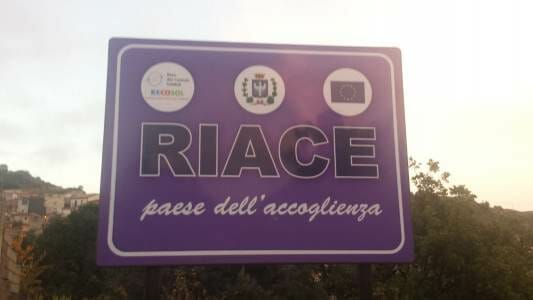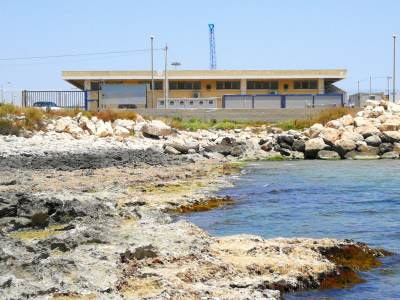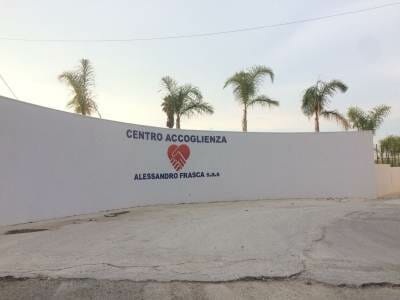“Who is speculating about what will happen to the refugees?” L’Espresso have carried out an inquiry into the managing of the North African Emergency
by Michele Sasso and Francesca Sironi
From L’ Espresso
€1,000,300,000: this is the current sum which has been spent by the State on assisting those who have escaped Lybia and Tunisa. A free flow of money without any controls which many a hotel owner, conman and cooperatives of various natures have been able to turn into business opportunities.
They were hungry and displaced, a wave of humans escaping the revolution in Tunisia and the war in Lybia. The exodus which took place between March and September of last year brought 60,000 people to our shores. Some of the refugees stayed in Italy whilst others sought to quickly move onto other parts of Europe. Only 21,000 actually remained, under the charge of the Civil Protection. But the assistance granted to these people without a homeland, has been managed amidst chaos and has given rise to a series of deceptions and scams. The total cost is staggering: by the end of this year it is said that it will reach 1 billion, 3 million euro. In practice, this breaks down to €20,000 for every man, woman and child who has arrived in our country. However, the money has not gone to them: the fast flowing millions have created a marketplace opening doors to all types of business people: unscrupulous hoteliers and corrupt cooperatives. For each refugee, the State designates €46 a day, without ever checking what type of conditions are being provided. In one known case on the outskirts of Rome, 10 migrants were crammed into a 35m² apartment. Thereby guaranteeing someone an income of over €12,000 a month.
IN THE NAME OF EMERGENCY- Once again ‘Emergency’ has become the magic word in order to get around procedures and checks. The public structures kept out of the picture and everything has been done by private contracts: a market within which to secure more refugees. But the worst is yet to come: funding is going to run out in January. If the government does not come up with any solutions, the refugees will find themselves on the streets.
In Italy there are African and Asian families who worked in Lybia under the Gaddafi regime. The first wave, largely made up of young Tunisians, made its way to France, thanks to the humanitarian permits authorised by the then minister Roberto Maroni. But when Paris closed the borders, the very same Maroni launched a federalist strategy: each region had to take a number of refugees in proportion to the number of its habitants (see chart p.39). The Civil Protection are responsible for coordinating everything and they have charged local prefectures or regional governments with the responsibility for the reception programme. But, in the rush, no rules were laid down to establish who has the right to provide accommodation for the refugees and how the refugees should be treated. As a result assistance has been able to transform into business: all that was needed was a phone call in order to receive the status of a “reception structure” and net €1,200 a month for each person. It has proven to be manna for hundreds of empty hotels, ex- agriturismi, disused holiday homes, residences and rundown holiday resorts.
THE REFUGEE MARKET- From the Alps to Gioia Tauro, those within tourism have focussed on refugees, at the expense of the State of course. Agreements are never a problem: they are directly signed with private companies, in total opacity. It is thanks to this very problem, for example, that 116 refugees were sent in shorts and sandals from Sicily to Val Camonica at 1,800m. The owners of the Le Baite di Montecampione Residence were far from being the only ones to get scent of such opportunities. In the nearby Val Palot, a local politician from the IDV(Italy of Values), Antonio Colosimo, actually placed 14 migrants in his holiday home in a wood. They were completely isolated for months with nothing else to do but look for mushrooms. There were even some providing accommodation who negotiated to get a better price. The Official Directive, who deals with refunding the €40 per day for food and lodging (the other €6 are designated for assistance), was only appointed in May. In the meantime, the vast majority of the private groups providing housing have been able to claim even higher figures.
The hoteliers in Naples managed to get a daily allowance of €43 a head. Not bad if you consider that there are 22 hotels which, even today, still provide accommodation to over a thousand people. “Tourism was at a low point at the moment when the migrants began to arrive,” admits Salvatore Naldi, president of the local Federalberghi. The Civil Protection promised that they would only be temporary structures. However, things did not turn out that way. One example is Hotel Cavour, situated in Piazza Garibaldi in front of the main railway station, where even today 88 North Africans are still residing. The rooms had been empty, the travellers were staying away due to the extensive building works which are being carried out in the square. But thanks to the refugees, the owners were able to end the season with almost €2 million lining their pockets.
Asylum seekers, however, are not tourists, but people who need to integrate into the community. The law states that the migrants must have access to cultural mediation services. Nonetheless, in many cases these have simply been a mirage or else contracts for the work have been doled out at random. “In Naples, dozens of associations suddenly appeared that nobody had ever heard of before,” denounced Jamal Qadorrah, Head of Cgil (Italian General Confederation for Work) Immigration in Campania. “The hotel owners were able to get whoever they wanted to provide the service for them, even though there is actually a regional register of competent groups. All of whom, naturally, were ignored.” It gets worse, Mohamed Saady, a trade unionist from Cisl (Confederation of Italian Trade Unionists) adds, “In July this year we organised a meeting between the local council and the hotel owners. It came to light that many of the structures still hadn’t recruited mediators.” At that time over a year had already passed since the beginning of the North African Emergency.
THE CLEVER ONES FROM THE MONASTERY- All this business created by the new arrivals even went as far as to touch those working in charitable professions. Cooperatives such as Domus Caritatis, which runs eight communities in Rome alone, ended up in the spotlight after criticism from Save the Children and from the Child and Adolescent Protection League in Lazio. After several warnings, the NGO carried out checks on 14 structures in the capital who were receiving €80 per day for the reception of unaccompanied minors. The outcome is a disturbing report, presented to the Civil Protection and the Minister of the Interior, which L’Espresso has managed to examine. The report not only speaks about overcrowding, but about homeless 40 year olds being passed off as kids escaping from Lybia. During the investigation 145 refugees were interviewed. “More than 100 were blatently over 18,” states the author of the report, Viviana Valastro, “Those who were in front of me were adults, definitely not 17 year olds- of this I am certain.” Furthermore, “many of them had been in Italy for some time, more than a few months. Some of them came from the riots that broke out in Rosarno.” A seemingly double scam therefore: not only the age, but also the origin- all to receive more money and pocket millions of euro. And this is all from a cooperative which is tightly linked to the Arciconfraternita del Santissimo Sacremento and San Trifone and La Cascina- a big catering cooperative which itself was the centre of an inquiry after attempting to enter into the management of CPTs (Centres of Temporary Stay for Foreigners) three years ago.
Save the Children have not been the only ones to denounce the situation in Rome. Even the President of Rome’s Secuirty, Fabrizio Santori, member of the Pdl (People’s Freedom Party) has had to deal with Domus Caritatis. The cooperative ran a community that caused many problems for those in the vicinity which in turn led to many protests. Santori visited the accommodation and found himself in front of a 35m² living space inhabited by 10 people. These conditions are worse than a prison. There was another case of an apartment in Via Arzana, half way between Rome and Fiumicino, closer to the airport than the city, which managed to rake in more than €12,000 a month.
Save the Children have calculated that approximately 950 people are living in structures such as these in the capital. However, the numbers remain unofficial as only five cooperatives complied with supplying information. Domus Caritatas, from its headquarters in the Tre Fontane Trappist Abbey, declined from offering any information whatsoever. The dossier of the international NGO describes absolute chaos: a lack of management, no orientation or accompanied legal services for the migrants, inadequate structures.
RECEPTION IN MILAN- The situation does not change in the north either. In Milan there are cases such as that of the former school in Via Saponaro, which is run by the Fratelli di San Francesco d’Assisi Foundation and has around 150 refugees. However, they are housed along with homeless people, minors and ex convicts. In total, there are 400 people all with different needs who are forced to live under the same room in an old school. “The conditions are horrible: 10 -12 beds in each room. The place is full of lice and fleas,” said one of the young men who is still a resident there. The rooms are completely inadequate as there were built to cater for school children, not refugees, or for that matter the homeless. “It is a container for society’s marginal groups where fights often break out: Nigerians against Kosovo people, Ghanaians against Moroccans and the list of those being hospitalised gets longer day by day,” another person who knows what it is like to live inside the school tells us. Even staff numbers have been reduced. There are very few cultural mediators (who are often former residents who don’t shy away from doing whatever they deem necessary to maintain order), just one social assistant and one psychologist, who is available for ten hours a week. This is not enough for those who have known the horrors of war, have received beatings from the Lybian police and who carry on their own skin the marks of violence. Mental health problems and alcoholism are both also widespread.
Seven kilometres from this structure, 440 refugees have accommodation in Pieve Emanuele, in the extreme southern outskirts of the city. They are staying in a residence called Ripamonti, which belongs to Fondaria Sai, which has just recently been taken over by Unipol, but initially everything was firmly in the hands of Salvatore Ligresti. Normally the hotel accommodates policemen, guards from the nearby prison or postmen, but they do not fill the 4,000 places which are available. Thanks to the Emergency however, in the year’s busiest weeks €600,000 a month was coming in. Forced holidays in comfortable accommodation (here the rooms even boast satellite tv) but where are the Italian lessons and the legal assistance and the pschological services? “It would be better to find accommodation which is more modest and invest in providing the necessary services,” a young man from Ghana said banally. Today there are 80 residents still living in Pieve Emanuele. But in the meantime the residence has taken €7 million.
FOR A PLATE OF RICE- The State spent €797 million in 2011 for the North African Emergency and the figure so far in 2012 stands at €495 million. Only a part of this was allocated for Reception purposes: hundreds of millions have gone to slums, transfers, refunds to the Coordination Office. Funds of which all trace has been lost. And yes, in order to make good use of public spending money, a “monitoring and assistance group” was set up, with the task of visiting structures and highlighting critical cases. But after a couple of months the inspectors all but disappeared. “We were part of the project but from October 2011, nobody called us. Considering that the project began in August, the group lasted less than three months,” explains Laura Boldrini, spokesperson for the UN High Commission for Refugees, to L’Espresso, “The region and the prefecture had absolutely no control whatsoever.” In the case of Calabria, the High Court went a step further: stating in black and white that the agreements in place in the region were illegal due to the fact that they had not been subjected to pre-emptive controls by the Court, something which is obligatory in the case of Emergency. Yet this was not all. A Judge in Catanzaro defined the daily allowance as “unnecessary”: €46 a day was too much. In Latina they almost managed to pocket the whole lot, spending just €5 a day on each of the migrants by providing 75 of them with a miserable place of rice. The five greedy members of the Fantasie cooperative were arrested by the Roccagorna carabinieri. Suspicious of the increase in the number of foreigners in the town, the military discovered 46 people living in 70m² in a small isolated house in the country. Yet despite this episode, the cooperative continued to receive contributions from the Lazio Region for a further six months: a scam amounting to €400,000. With the same resources Aurelio Livraghi, a volunteer for Caritas di Magenta, in the province of Milan, managed to create a completely different situation, “Millions of Italians live on €1,200 a month- why can’t they?” A simple observation from a pensioner who dedicated his time to the 35 refugees who arrived in his village. Today they are independent: they pay rent, do their own shopping, four of them have already found work, some even act in the local theatre. They live normal lives; something completely different from what is commonly associated with the notion of Emergency. But what will happen when the funds run out? “They will be all right for a while because they have managed to put aside some of their money.” This could have been done elsewhere in Italy. It wasn’t difficult, the slightest bit of organisation would have been enough and, of course, humanity.




